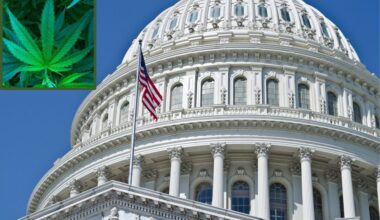Congressional lawmakers just got an update on how different federal courts across the country are interpreting a spending bill rider that has generally shielded state medical marijuana programs from interference by the Department of Justice (DOJ).
The provision, first approved as part of large-scale appropriations legislation in 2014 and renewed each year since, stipulates that DOJ funding cannot be used to prevent states and territories from “implementing their own laws that authorize the use, distribution, possession, or cultivation of medical marijuana.” But courts have had varying interpretations about the extent to which those protections apply, a new report from the Congressional Research Service (CRS) explains.
In its analysis, CRS looks at how cases have played out in two different federal appeals courts: the Ninth Circuit and First Circuit. The report showcases how the courts have diverged in opinion on the rider and discusses options that Congress has to resolve that disconnect.
“On its face, the appropriations rider bars DOJ from taking legal action against the states directly in order to prevent them from promulgating or enforcing medical marijuana laws,” the report, which was published last week, says. “In addition, federal courts have interpreted the rider to prohibit certain federal prosecutions of private individuals or organizations that produce, distribute, or possess marijuana in accordance with state medical marijuana laws.”
—
Are you looking for ways to keep people coming back to your business’s website? Syndicating Marijuana Moment’s breaking cannabis news and analysis is the way to do it.
Marijuana Moment’s Wire Service helps our paying subscribers boost SEO and lets your potential customers know you are watching all the latest key policy developments that affect them.
Now you can publish smart cannabis content on your site without having to hire your own dedicated editorial staff to track, make sense of and synthesize news developments your readers are looking for information about.
Contact Marijuana Moment for pricing information today.
—
“In those cases, criminal defendants have invoked the rider before trial, seeking the dismissal of their indictments or injunctions barring prosecution,” it says. “By contrast, courts have generally declined to apply the rider outside the context of initial criminal prosecutions.”
Looking at the Ninth Circuit, judges determined in a 2016 case that “individuals who do not strictly comply with all state-law conditions regarding the use, distribution, possession, and cultivation of medical marijuana have engaged in conduct that is unauthorized, and prosecuting such individuals does not violate [the rider].”
And that same court has relied on that judgment as the basis on allow several cannabis-related prosecutions by DOJ, including one case where two people were growing cannabis in a legal state and also smoked the product as they were processing it for sale. The court allowed the case to proceed because they found a lack of evidence that they were “strictly” complying with the state medical marijuana law because they could’ve prove that they were qualified patients under the program.
But while the Ninth Circuit clearly expressed that patients and businesses must operate in strict compliance with state cannabis laws, a decision in recent case from this year by the First Circuit Court of Appeals takes a different interpretation.
In that case, defendants who were registered to grow medical marijuana in Maine were accused of selling excess quantities, including to people in other states, which would violate both state and federal law.
“Following indictment for criminal CSA violations, the defendants sought to invoke the appropriations rider to bar their prosecutions,” CRS said. “They argued that the rider ‘must be read to preclude the DOJ, under most circumstances, from prosecuting persons who possess state licenses to partake in medical marijuana activity.’” And the Justice Department urged the court to rely on the Ninth Circuit assessment on the rider’s limitations.
While the panel found that the defendants were not protected by the rider, the First Circuit ultimately disagreed with the Ninth Circuit’s interpretation of strict compliance with state medical cannabis laws. In its ruling, the First Circuit judges said that “the potential for technical noncompliance [with state law] is real enough that no person through any reasonable effort could always assure strict compliance.”
“Thus, the First Circuit concluded that requiring strict compliance with state law would likely chill state-legal medical marijuana activities and prevent the states from giving effect to their medical marijuana laws. On the other hand, the court also rejected the defendants’ more expansive reading of the rider, reasoning that ‘Congress surely did not intend for the rider to provide a safe harbor to all caregivers with facially valid documents without regard for blatantly illegitimate activity.’”
“Ultimately, while the First Circuit held that the rider bars CSA prosecution in at least some cases where the defendant has committed minor technical violations of state medical marijuana laws, it declined to ‘fully define [the] precise boundaries’ of its alternative standard,” the new report says.
CRS researchers said that it’s unclear whether the differences between the court assessments “will make a practical difference in federal marijuana prosecutions.”
“In theory, the First Circuit’s analysis could make it easier for defendants to invoke the appropriations rider to bar federal prosecutions, because they could do so even if they had not been in strict compliance with state law,” it said. “In practice, however, resource limitations and enforcement priorities have historically meant that federal marijuana prosecutions target individuals and organizations that clearly have not complied with state law.”
Finally, the report offered some thoughts about actions Congress could take on the issue in the future.
It could repeal the rider, amend it to define the level of non-compliance that warrants prosecution or even expand it “to bar the expenditure of funds on prosecutions related to recreational marijuana or other controlled substances.”
Broader language to protect all state and territory marijuana programs did pass as part of appropriations legislation in the House in 2019 and 2020, but the were not ultimately incorporated into the final package sent to the president’s desk.
CRS also talked about how Congress could affect change outside of the appropriations process. While it could push for more aggressive legislation that enables enforcement of prohibition, the agency recognized that “most recent proposals before Congress generally seek to relax federal restrictions on marijuana or mitigate the disparity between federal and state marijuana regulation.”
For example, Senate Majority Leader Chuck Schumer (D-NY) recently discussed his plan to formally introduce a bill to federally legalize marijuana by April. The House sponsor of a separate legalization bill also gave updates on his reform agenda.
Late last year, CRS also released a report affirming that President Joe Biden can grant mass amnesty to people who have violated federal marijuana laws, and his administration can also move to federally legalize cannabis without waiting for lawmakers to act.
Maryland Senate Bill Would Provide ‘Cost-Free Access’ To Psychedelics For Military Veterans
Photo courtesy of Max Pixel.
Medical Disclaimer:
The information provided in these blog posts is intended for general informational and educational purposes only. It is not a substitute for professional medical advice, diagnosis, or treatment. Always seek the advice of your physician or other qualified healthcare provider with any questions you may have regarding a medical condition. The use of any information provided in these blog posts is solely at your own risk. The authors and the website do not recommend or endorse any specific products, treatments, or procedures mentioned. Reliance on any information in these blog posts is solely at your own discretion.







